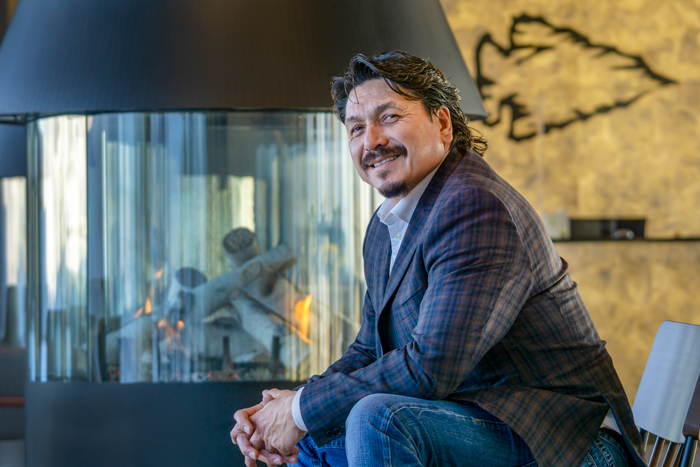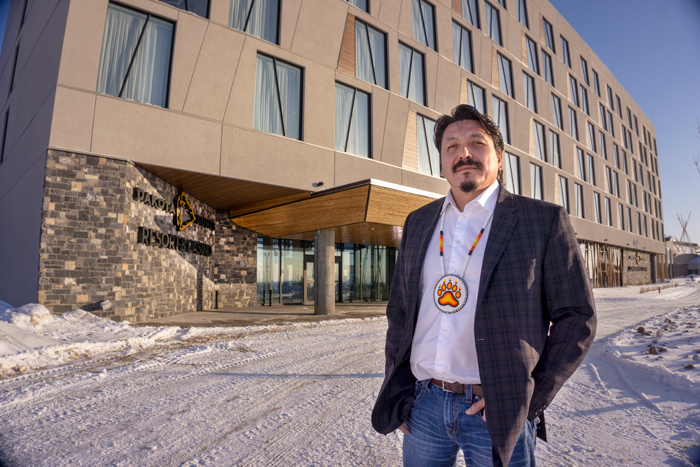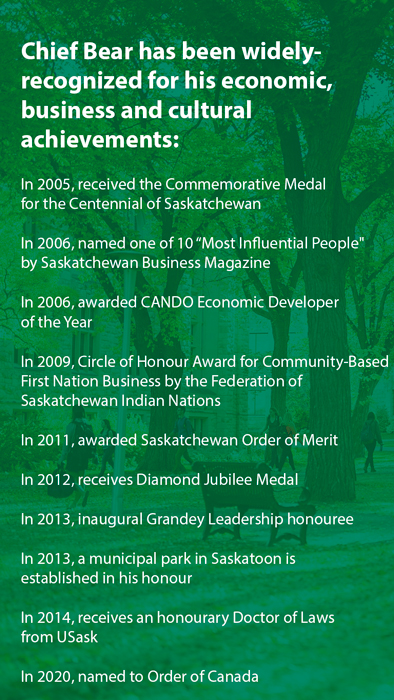
Planting seeds for the future
Chief Darcy Bear (BUSADM’09, DDL’14) leads the Whitecap Dakota First Nation into prosperity.
By John GraingerChief Darcy Bear’s (BUSADM’09, DDL’14) grandparents tended their large vegetable garden every summer on the Whitecap Dakota First Nation.
They tilled the soil, planted the seeds, kept a close eye for unwanted weeds and made sure it was watered sufficiently. This was part of his community’s way of life.
That hard work helped to sustain his family through each winter until spring when they would go through those gardening processes once again.
Chief Bear’s fiancé, Jennifer Heimbecker (BA’08), has encouraged the pair to continue their gardening efforts as stewards of the land while continuing the examples of sustainability that was so entrenched in his upbringing.
“This is something we also enjoy to do together,” he says. “She’s brought back that value of hard work while making it enjoyable for both of us.”
The modeling the pair do in the garden is something that translates to the rest of the community at Whitecap.
“Seeing all those sacrifices and hard work really resonated with me. But we grew up happy,” says Bear.
Today, he’s working just as diligently as his grandparents did to create opportunities and ensure his people have a better tomorrow.
“When we were growing up, there wasn’t anything here. There were just gravel roads, no jobs and no opportunities,” says Bear. “A lot of our homes didn’t even meet national building code.”
He thought, enough was enough; it was time to do something about it. At 23, Bear was elected to band council. Three years later, he was elected chief. In November 2021, Bear will celebrate 30 years of service on council and as chief.
You could say Bear, also chair of the board of the Whitecap Development Corporation, has been tending to his own garden by trying to create a more prosperous tomorrow for his people.
Golf course creates a big draw
The reserve’s nationally ranked golf course teed off in 2004. It quickly developed a national reputation and has been host of the Dakota Dunes Open, part of the PGA Canada Mackenzie series.
Following the success of the golf course, the Dakota Dunes casino opened its doors in the fall of 2007, providing Whitecap and partners, Saskatoon Tribal Council and the Saskatchewan Indian Gaming Authority, with more economic growth and opportunities.
All of this was possible with Bear’s oversight to enhancing the infrastructure of Whitecap. To date, there has been in excess of $150 million of capital and economic investment on Whitecap land.
Bear insists his Whitecap ancestors were ahead of their time and notes he embodies their firmly established work habits. He believes it’s important to know where he came from.
“I think we all need to do that, understand our history and where we come from. For us, we’re Dakota people."
“What does Dakota mean? In our language, Dakota means ally. Our ancestors were always big on alliances, building partnerships. Just looking at that, that’s the way our ancestors operated and we need to build alliances,” he says.
Chief Whitecap had good relations with John Lake and the forefathers of Saskatoon. The city recognized him with a statue downtown in 2008. Bear wants to continue the tradition.
“I always see (Chief Whitecap) as a visionary where he picked out the location for our primary market.”
Last month, Bear was named to the Order of Canada in recognition of shepherding his community for the last three decades.
“It’s humbling, but also recognizes the hard work we are doing in our community.”
Hotel opens for business
Whitecap’s newest piece of its growing local economy is now in place. A $38-million hotel and convention centre opened in October 2020, albeit without as much fanfare because of the COVID-19 pandemic. It features 155 rooms, a fitness centre, a pool and a five-star restaurant and is linked to the casino.

“This project has been 11 years in the making,” says Bear. “We had a number of national conferences that were booked for this fall, but sadly, because of COVID they were cancelled.”
Bear says when fully operational, there will be about 150 staff at the hotel and convention centre. These days about 60 employees are working, but once a vaccine arrives, Bear expects the facility will beginning operating at full strength.
Chief Bear is quick to deflect any personal accolades about his role in creating resort expansion.
“Personally, as a leader you can never do things alone. You have to surround yourself with good people, a good team. You need the support of your people as well.”
Bear and his community are always willing to pass along their experiences if asked for advice from other First Nations in order to create more economic opportunities for Indigenous people.
Importance of education
One integral part of his process is making sure the young people of Whitecap receive the education they need to succeed. Having links to post-secondary institutions, like USask, is important he says.
“By sending our people to school, it’s an investment,” says Bear, who was bussed into Saskatoon schools after Grade 5 before buying his own vehicle in Grade 11 so he could drive himself into the city.
Bear has made it a priority that any Whitecap Dakota student wanting to further their education after Grade 12 will receive post-secondary assistance to ensure they have that opportunity.
Bear’s family is setting an example for others to follow. All three of his children have gone on to receive post-secondary educations. His eldest son attended the Saskatchewan Indian Institute of Technologies (SIIT) for business administration. His daughter received an arts degree before going into law and is now articling with Saskatoon firm McKercher LLP. His youngest son is in his third year at the Edwards School of Business.
Having employed people in the community brings happiness to families, he says.
“Even just to see the kids and their smiles because there’s no better role model than when mom and dad are going to work, it’s a good thing to see,” says Bear. “We should, as Indigenous people, have the same living standards and same opportunity as every other Canadian citizen and the children should be able to see mom and dad go to work every day. That gets passed down from generation to generation.”
One strategic alliance he initiated that increased access to education is a partnership with USask and SIIT, of which he is board chair.
Through an agreement with the Edwards School of Business, students can take their first two years at SIIT and then transfer to USask for their final two years and a business degree.
“Now it’s happening. We’ve so many young Indigenous people taking that pathway,” says Bear. “If we can educate them so they can occupy all those jobs going forward. … It’s all part of the strategy.
“Our people should be our No. 1 resource and we have to invest in them and make sure there are opportunities for them and a career path.”
Still planning for the future

Bear says he must plant a few more seeds to help grow the Whitecap community. Plans are in place for a thermal spa to be added onto the hotel as part of a growing effort to be a resort destination, not just for Saskatchewan residents, but nationally and internationally.
He expects another 100 jobs to be added for the spa alone. Tendering for the project will likely begin once the pandemic pressures ease.
Bear would like to see some of the First Nation land along the South Saskatchewan River be utilized for tourism, creating hiking and equestrian trails.
He says Chief Whitecap was extremely wise when he picked this location along the banks of the South Saskatchewan. It offers so much to Whitecap residents and will continue create many opportunities for the tourism sector.
“We’ve got plans for some cabins and teepee villages that people can stay in and have that experience,” says Bear.
One of Saskatoon’s summer staples on the tourism schedule is the annual Shakespeare on the Saskatchewan. Bear would like to eventually see something similar at Whitecap, potentially creating a partnership with an Indigenous theatre group.
Building a new subdivision that will provide better housing for families and seniors and elders is also high on his agenda.
But as his grandparents knew, you have to plants the seeds before anything will grow.
“I don’t believe in the word, can’t. We have to try.”


